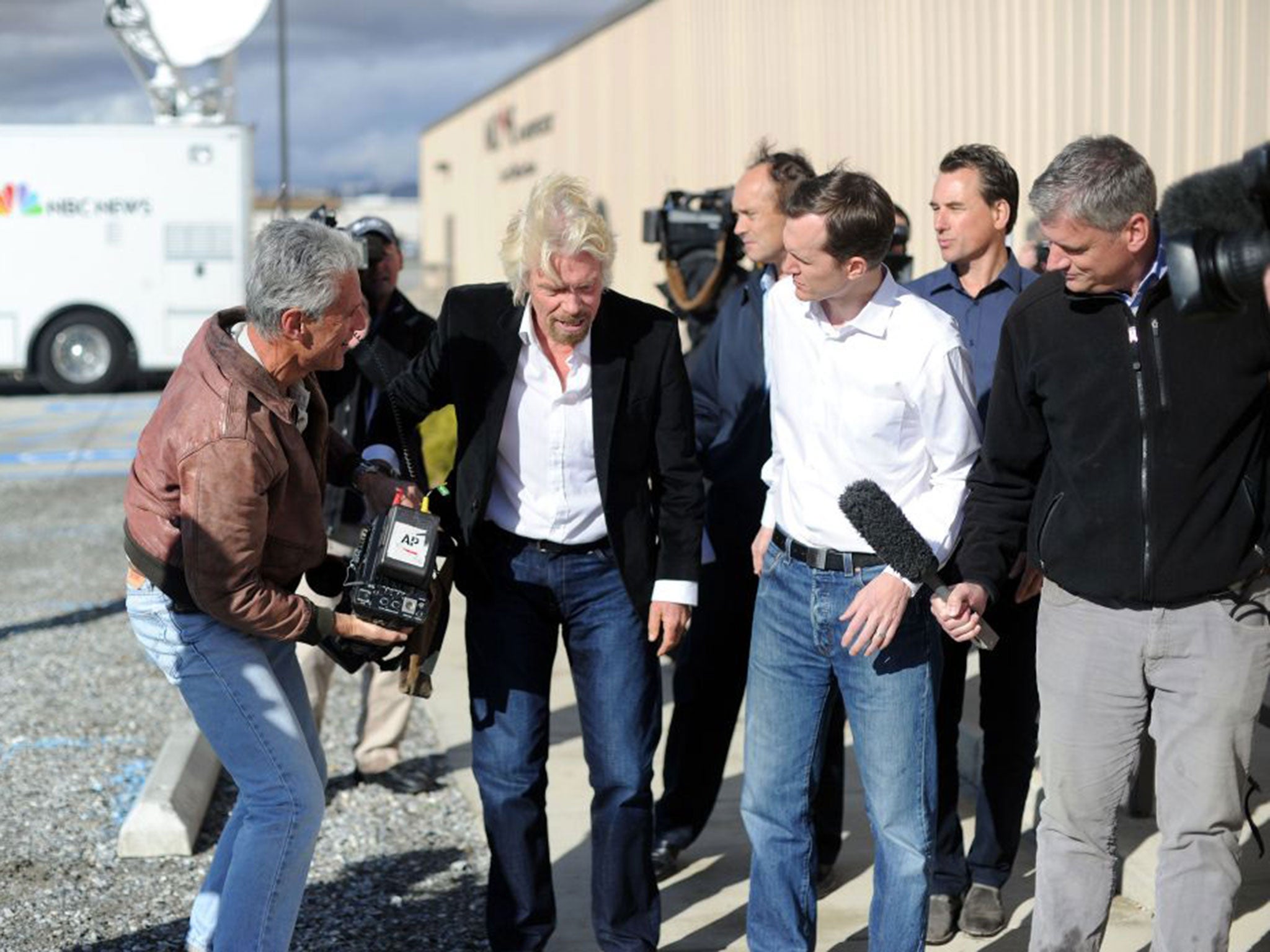Virgin Galactic crash: Space flight is ‘real challenge’, experts tell defiant Branson
Entrepreneur has 'too much hubris' and 'too little knowledge' to be involved in the space business, according to critics

Your support helps us to tell the story
From reproductive rights to climate change to Big Tech, The Independent is on the ground when the story is developing. Whether it's investigating the financials of Elon Musk's pro-Trump PAC or producing our latest documentary, 'The A Word', which shines a light on the American women fighting for reproductive rights, we know how important it is to parse out the facts from the messaging.
At such a critical moment in US history, we need reporters on the ground. Your donation allows us to keep sending journalists to speak to both sides of the story.
The Independent is trusted by Americans across the entire political spectrum. And unlike many other quality news outlets, we choose not to lock Americans out of our reporting and analysis with paywalls. We believe quality journalism should be available to everyone, paid for by those who can afford it.
Your support makes all the difference.When Sir Richard Branson decided to set up Virgin Galactic in 2004, it was meant to be the final step before the fulfilment of teenage dream inspired by the 1969 Moon landing.
But the wonder he experienced as a 19-year-old watching Neil Armstrong make that “giant leap for mankind” will forever be tarnished by the death of a test pilot in the explosion that destroyed Virgin’s SpaceShipTwo on Friday.
Hours later, Sir Richard’s critics were not holding back. He had “too much hubris” and “too little knowledge” to be involved in the space business, wrote Jeffrey Kluger, a Time magazine journalist and author of the book Apollo 13, which was later made into a film.
Branson’s biographer Tom Bower told Radio 4 on Sunday: “The problem is that Branson placed so much of his commercial future on this rocket, because it was such a brilliant PR stunt … But it was always dangerous and it was always going to end in tragedy.”
It might be unfair on Sir Richard to expect him to have a detailed knowledge of aerospace engineering. However, he has made repeated predictions that paying passengers would soon be travelling into space.
Sir Richard has been successful in drumming up support for Virgin Galactic, not least from the people of New Mexico. They even voted for a tax rise to fund the $225m (£141m) “Spaceport America” in the Mojave Desert that Virgin Galactic uses as its operational base. In 2005, Sir Richard said the company hoped to begin space flights by 2008. Thousands of jobs were to be created in one of America’s poorest states.
The optimism was based on the success of its partner company, Scaled Composites, which won the $10m Ansari X prize for sending a privately owned manned vessel into space in 2004. It may have seemed simple to build a bigger version of Scaled’s SpaceShip-One to take passengers.
Disaster struck in July 2007 when three people were killed in an explosion during an equipment test on the ground. Scaled was fined more than $25,000 for “serious” health and safety violations.
Despite this setback, Virgin Galactic secured $280m from the Abu Dhabi state investment firm Aabar in 2009. In October 2010, SpaceShipTwo made its first manned flight. Getting the spaceship to piggyback on a plane for the first part of the flight was supposed to make the rocket-ignition process safer. On its website, Virgin Galactic says: “Effectively detonating a huge bomb at ground level means everything has to go right first time – if it doesn’t there are generally few options for those inside.”
Problems with one part of that “bomb”, the rubber solid fuel, prompted the engineers to switch to a plastic version, which was tested for the first time on Friday.
Despite this being the first test of a key element of any rocket, Sir Richard told the FT in an interview published on Friday that he expected he would go into space in March.
Dr Sten Odenwald, a Nasa consultant, said: “My big concern is that with business enterprises there’s always a model that pushes you to develop as quickly as possible, whereas the pressure for speed in a government programme is not nearly as great.”
Professor Tim O’Brien, associate director of the Jodrell Bank Observatory in Cheshire, said space flight was “a real challenge” and “not a joyride”.
Join our commenting forum
Join thought-provoking conversations, follow other Independent readers and see their replies
Comments